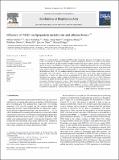Influence of PDZK1 on lipoprotein metabolism and atherosclerosis
Author(s)
Kocher, Olivier; Yesilaltay, Ayce; Zhang, Songwen; Daniels, Kathleen; Pal, Rinku; Chen, Jianzhu; Krieger, Monty; Shen, Chase; ... Show more Show less
DownloadKrieger_Influence of.pdf (440.4Kb)
PUBLISHER_POLICY
Publisher Policy
Article is made available in accordance with the publisher's policy and may be subject to US copyright law. Please refer to the publisher's site for terms of use.
Terms of use
Metadata
Show full item recordAbstract
PDZK1 is a scaffold protein containing four PDZ protein interaction domains, which bind to the carboxy termini of a number of membrane transporter proteins, including ion channels (e.g., CFTR) and cell surface receptors. One of these, the HDL receptor, scavenger receptor class B type I (SR-BI), exhibits a striking, tissue-specific dependence on PDZK1 for its expression and activity. In PDZK1 knockout (KO) mice there is a marked reduction of SR-BI protein expression (~ 95%) in the liver, but not in steroidogenic tissues or, as we show in this report, in bone marrow- or spleen-derived macrophages, or lung-derived endothelial cells. Because of hepatic SR-BI deficiency, PDZK1 KO mice exhibit dyslipidemia characterized by elevated plasma cholesterol carried in abnormally large HDL particles. Here, we show that inactivation of the PDZK1 gene promotes the development of aortic root atherosclerosis in apolipoprotein E (apoE) KO mice fed with a high fat/high cholesterol diet. However, unlike complete SR-BI-deficiency in SR-BI/apoE double KO mice, PDZK1 deficiency in PDZK1/apoE double knockout mice did not result in development of occlusive coronary artery disease or myocardial infarction, presumably because of their residual expression of SR-BI. These findings demonstrate that deficiency of an adaptor protein essential for normal expression of a lipoprotein receptor promotes atherosclerosis in a murine model. They also define PDZK1 as a member of the family of proteins that is instrumental in preventing cardiovascular disease by maintaining normal lipoprotein metabolism.
Date issued
2008-03Department
Massachusetts Institute of Technology. Department of Biology; Koch Institute for Integrative Cancer Research at MITJournal
Biochimica et Biophysica Acta (BBA) - Molecular Basis of Disease
Publisher
Elsevier
Citation
Kocher, Olivier, Ayce Yesilaltay, Ching-Hung Shen, Songwen Zhang, Kathleen Daniels, Rinku Pal, Jianzhu Chen, and Monty Krieger. “Influence of PDZK1 on Lipoprotein Metabolism and Atherosclerosis.” Biochimica et Biophysica Acta (BBA) - Molecular Basis of Disease 1782, no. 5 (May 2008): 310–316. Copyright © 2008 Elsevier B.V.
Version: Final published version
ISSN
09254439